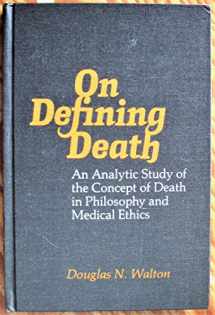
On Defining Death: An Analytic Study of the Concept of Death in Philosophy and Medical Ethics
Book details
Summary
Description
In this book, Douglas Walton examines the philosophical nature of two issues currently associated with medical ethics. In order to work towards an analysis of the concept of death that could function as a target towards which the medical criteria of death could be directed, he proposes the foundations for a theory free of logical contradictions, paradoxes, and other perplexities. This is the "superlimiting theory" which introduces the notion of a "possible person." The connection of these philosophical ideas with medico-legal concerns like brain death and the Harvard criteria is discussed. Professor Walton then goes on to examine the difference between killing and letting die. Through a close study of the logic of action sentences, he develops a model that is discussed in the light of the ethical and jurisprudential realities of medical ethics to see if the distinction between bringing something about (actively) and letting something happen (passively) is one that makes a moral difference in the evaluation of actions. Numerous problematic conceptual snags are dealt with, and the author consistently supports the conceptual clarity and respectability of the distinction. Other relevant discriminations of an action-theoretic sort, such as that between "direct" and "indirect" euthanasia, are studied, and the concluding chapter applies the conceptual analysis to a philosophical discussion of attitudes towards death, asking, "Is it rational to fear death ?"


We would LOVE it if you could help us and other readers by reviewing the book
Book review



